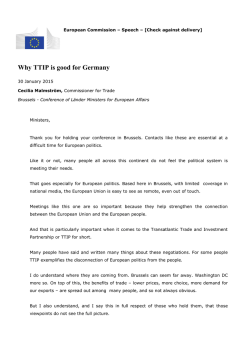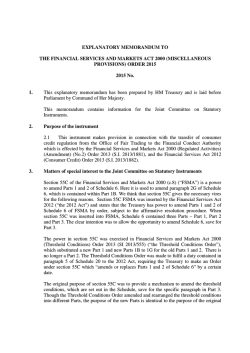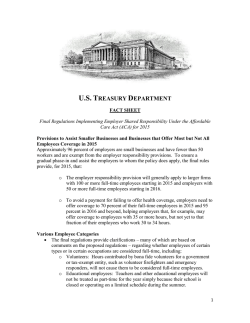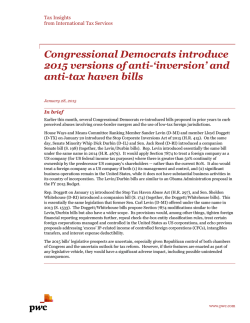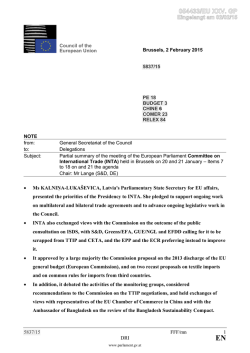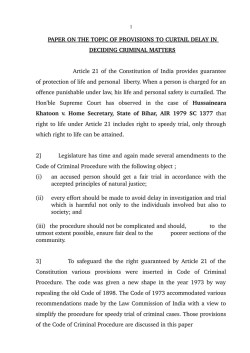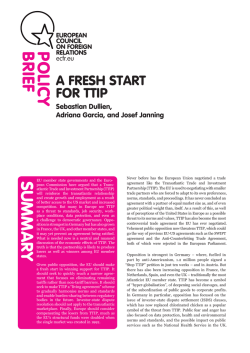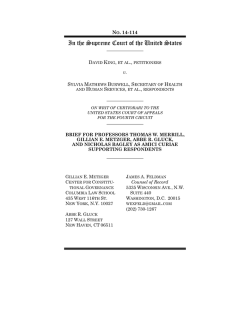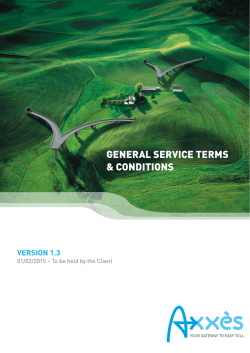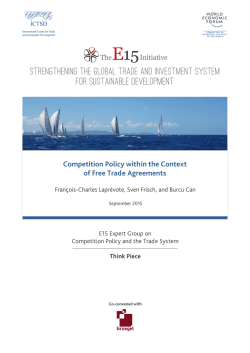
This is an initial textual proposal for a draft Chapter on
REMARKS: This is an initial textual proposal for a draft Chapter on Regulatory Cooperation
that the Commission intends to submit to the US on Friday, 30 January, in preparation of the
8th round of TTIP negotiations.
*
*
*
Initial Provisions for
CHAPTER [ ] - Regulatory Cooperation
General notes:
1. As TTIP negotiations progress, the provisions in this Chapter may be reviewed in the light
of developments in other Chapters, and vice versa, with a view to resolving possible
duplications, overlaps or inconsistencies. In particular, there is a need to consider the
relationship with the TBT and SPS chapters as well as with sectoral provisions, including
those on Financial Services. Sectoral provisions are intended to respond to the specific
needs of a sector. It will be important to strive as far as possible for coherence and
consistency between the approaches and solutions embodied in the sectoral provisions, on
the one hand, and those in other parts of TTIP (including this Chapter), on the other hand. In
case of overlap or doubt, the sectoral provisions shall prevail, and it cannot be ruled out that
in some instances such sectoral provisions might have a comprehensive character.
2. Given that the provisions of this Chapter concern predominantly procedures for
cooperation, they may not lend themselves to the application of dispute settlement rules.
Alternative mechanisms for ensuring proper application could be explored, such as regular
monitoring and reporting, including to the political level (Joint Ministerial Body). As regards
the sectoral provisions of the TTIP regulatory cluster, further reflection will be required as
regards the most appropriate mechanisms of ensuring proper application. In respect of
cooperation on financial services, the EU has expressed the view that provisions should not
be subject to dispute settlement.
3. This draft covers regulatory acts at "central" level, understood as EU-level and US
Federal acts. The draft also includes placeholders for regulatory acts of US States and of the
central national authorities of EU Member States. Cooperation on those other regulatory
acts will need to be addressed further, in order to achieve the objective of enhancing
regulatory cooperation and reliance on good regulatory practices.
4. "Party" or "the Parties" in this draft refers to the EU, on one side, and the US, on the
other, consistent with the focus on regulatory acts at "central" level. In terms of the practical
application of the provisions, particularly as regards the possibility to discuss regulatory acts
at "non-central" level, each side will take any necessary steps, including as regards the
determination of the specific actors who will implement the agreed rules.
5. The institutional and decision-making modalities in the horizontal chapter regarding the
update, modification or addition of sectoral provisions will need to be discussed as
negotiations on the regulatory cluster and the general institutional provisions of TTIP
proceed.
Preamble1 to the TTIP: The Parties, having regard to:
- the importance of regulation to achieve public policy objectives, and their right to regulate
and adopt measures to ensure that these objectives are protected at the level that each Party
considers appropriate, in line with its respective principles;
Section I: Objectives, definitions and scope
Article 1 - General Objectives and Principles
1.
The general objectives of this Chapter2 are:
a)
To reinforce regulatory cooperation thereby facilitating trade and investment in a way
that supports the Parties' efforts to stimulate growth and jobs, while pursuing a high
level of protection of inter alia: the environment; consumers; human, animal and
plant life, health and safety; personal data; cybersecurity; cultural diversity; or
preserving financial stability;
b)
To reduce unnecessarily burdensome, duplicative or divergent regulatory
requirements affecting trade or investment, particularly given their impact on small
and medium sized enterprises, by promoting the compatibility of envisaged and
existing EU and US regulatory acts;
c)
To promote an effective, pro-competitive regulatory environment, which is
transparent and predictable for citizens and economic operators;
d)
To further the development, adoption and strengthening of international instruments,
and their timely implementation and application, as a means to work together more
effectively with each other and with third countries to strive toward consistent
regulatory outcomes.
2.
The provisions of this Chapter do not restrict the right of each Party to maintain, adopt
and apply measures to achieve legitimate public policy objectives, such as those
mentioned in paragraph 1, at the level of protection that it considers appropriate, in
accordance with its regulatory framework and principles.
1
NB: These considerations are of a broader nature and would fit best in the preamble to the TTIP
Agreement.
NB: The provisions as set forth in this Chapter cannot be interpreted or applied as to oblige either
Party to change its fundamental principles governing regulation in its jurisdiction, for example in the
areas of risk assessment and risk management
2
3.
The Parties reaffirm their shared commitment to good regulatory principles and
practices, as laid down in the OECD Recommendation of 22 March 2012 on
Regulatory Policy and Governance.
Article 2- Definitions
For the purposes of this Chapter the following definitions shall apply:
a) “regulatory acts at central level” means:
for the EU:
i. Regulations and Directives within the meaning of Article 288 of the Treaty on the
Functioning of the European Union, including:
ii. Regulations and Directives adopted under a legislative procedure in
accordance with that Treaty;
iii. Delegated and Implementing acts adopted pursuant to Articles 290 and 291
of that Treaty.
for the US:
i. Federal Statutes;
ii. (A) Rules as defined in 5 USC § 551 (4); (B) Orders, as defined in 5 USC § 551
(6); and (C) Guidance documents, as defined in Executive Order 12,866 § 3(g) issued
by any federal agency, government corporation, government controlled corporation or
other establishment in the executive branch of government covered by 5 USC § 552
(f) (1) of the Administrative Procedures Act, as amended;
iii Executive Orders and [other executive documents that lay down general rules or
mandate conduct by government bodies].
b) “regulators and competent authorities at central level” means:
i. for the EU, the European Commission;
ii. for the US, US Federal agencies [defined by the Administrative Procedures Act
(APA); 5 U.S.C. § 552 (f)].
c) “international instruments”3 means documents adopted by international bodies or fora in
which both Parties' regulators and competent authorities at central level participate, including
as observers, and which provide requirements or related procedures, recommendations or
3
NB: This definition captures documents produced by international bodies in which both the Commission
and US federal government or one or more of its agencies participate, including for example bodies like the,
UNECE, OECD, IMDRF or the ICH; but the definition excludes bodies such as IEC, ISO, the ESOs, or US
private standardisation bodies. The TBT Chapter is expected to cover cooperation in the area of product
standards, generally; sectoral provisions in TTIP may also cover cooperation on standards.
guidelines on the supply or use of a service, such as for example authorization, licensing,
qualification or on characteristics or related production methods, presentation or use of a
product.
Article 3 – Scope
1.
The provisions of Section II apply to regulatory acts at central level which:
a)
determine requirements or related procedures for the supply, or use of a service in the
territory of a Party, such as for example authorization, licensing, or qualification; or
b)
determine requirements or related procedures applying to goods marketed in the
territory of a Party concerning their characteristics or related production methods,
their presentation or their use; and
2.
The provisions of Section III apply to regulatory acts at central level that fulfil the
criteria in paragraph 1 and that have or are likely to have a significant impact 4 on trade
or investment between the Parties.
3.
Regulatory acts at central level concerning the matters covered by [specific or sectoral
provisions concerning goods and services, to be identified] fall in any event within the
scope of this Chapter.
[Scope may be revised in accordance with general note n°3]
Article 4 – Relationship with sectoral provisions
1.
In case of any inconsistency between the provisions of this Chapter and the provisions
laid down in [specific or sectoral provisions concerning goods and services, to be
identified], the latter shall prevail.5
2.
Regulatory cooperation in financial services shall follow specific provisions set out in
[to be identified – FS chapter/section….].
Section II: Good Regulatory Practices
[Placeholder –measures or actions may be envisaged to facilitate the availability of
information and the implementation of good regulatory practices with regard to regulatory
acts at the level of the US States or the central national authorities of EU Member States]
4
NB: The regulators and competent authorities at central level of each Party will identify regulatory acts that
may have a significant impact on EU-US trade (see also Article 9 par. 1). Further discussion will be needed
on how to identify these acts.
5
NB: The relationship of specific and sectoral provisions in TTIP and the Horizontal Chapter will need to be
kept under review as both sets of provisions are taking shape.
Sub-section II.1. Transparency
Article 5 – Early information on planned acts
1.
Each Party shall make publicly available at least once a year a list of planned
regulatory acts at central level6, providing information on their respective scope and
objectives.7
2.
For planned regulatory acts at central level undergoing impact assessment each Party
shall make publicly available, as early as possible, information on planning and
timing leading to their adoption, including on planned stakeholder consultations and
potential for significant impacts on trade or investment.
Article 6– Stakeholder Consultations
1.
When preparing regulatory acts at central level undergoing impact assessment, the
regulating Party shall offer a reasonable opportunity for any interested natural or legal
person, on a non-discriminatory basis, to provide input through a public consultation
process, and shall take into account8 the contributions received in the finalisation of
their regulatory acts. The regulating Party should make use of electronic means of
communication and seek to use dedicated single access webportals, where possible.
2. [Placeholder – a provision on the publication and entry into force of adopted regulatory
acts may be envisaged in this Chapter, taking into account whether a horizontal provision is
included elsewhere in the TTIP text]
Sub-section II.2 Regulatory Policy Instruments
Article 7- Analytical Tools
1.
The Parties affirm their intention to carry out, in accordance with their respective
rules and procedures, an impact assessment for planned regulatory acts at central
level.
6
NB: Draft regulatory acts proposed by the US Administration to Congress are considered as "planned" acts,
as are bills introduced by Congressmen.
7
NB: Parties can in practice comply with this provision by publishing a more comprehensive list of
regulatory acts.
8
NB: This is an obligation for regulators to examine comments on their merits, but not to take on board
suggestions put forward by stakeholders. The language used ("take into account") is standard in
international agreements dealing with regulatory matters and consultation: for instance, see Article 2.9.4 of
the TBT Agreement.
2.
3.
Whenever carrying out impact assessments on regulatory acts at central level, the
regulating Party shall, among other aspects, 9 assess how the options under
consideration:
a)
relate to relevant international instruments;
b)
take account of the regulatory approaches of the other Party, when the other
Party has adopted or is planning to adopt regulatory acts on the same matter;
c)
impact on international trade or investment10.
With regard to regulatory acts at central level:
a)
the findings of impact assessments shall be published no later than the
proposed or final regulatory acts;
b)
the Parties shall promote the exchange of information on available scientific and
economic evidence and data as well as on the methodology and economic
assumptions applied in regulatory policy analysis11;
c)
the Parties shall promote the exchange of experience and share information on
planned ex-post evaluations and retrospective reviews.
Section III: Regulatory Cooperation
[NB: See general note on the relationship of this Chapter with other TTIP Chapters]
Article 8 – Bilateral cooperation mechanism
1.
The Parties hereby establish a bilateral mechanism to support regulatory cooperation
between their regulators and competent authorities at central level to foster
information exchange and to seek increased compatibility between their respective
regulatory frameworks, where appropriate.
2.
The mechanism would further aim at identifying priority areas for regulatory
cooperation to be reflected in the Annual Regulatory Cooperation Programme referred
to paragraph 2(a) of Article 13.
9
10
NB: These would include, for instance, relevant consumer or environmental protection impacts that Parties
may assess in line with their respective frameworks.
NB: In this context, this will include EU-US trade and investment, which is understood to include the
interests of investors of the other Party.
11
NB: Any exchange of information needs to respect the rules to be agreed on the exchange of confidential
information, see placeholder in Article 9, and needs to be consistent with each Party's legal framework as to
information protected by intellectual property rights.
3.
Each Party shall designate an office in its central administration to act as a Focal Point
responsible for exchanging information about envisaged and existing regulatory acts
at central level. Those exchanges include submissions concerning acts that are being
prepared or reviewed by each Party's legislative authorities.12.
[Placeholder for further details on the Focal Points.]
Article 9- Information and Regulatory Exchanges
1.
When a Party publishes a list of planned regulatory acts referred to in Article 5.1 13, it
shall identify those acts that are likely to have a significant impact on international
trade or investment, including trade or investment between the Parties, and it shall
inform the other Party through their respective Focal Points.
2.
A Party shall also regularly inform the other Party about proposed regulatory acts that
are likely to have a significant impact on international trade or investment, including
trade or investment between the Parties, where those proposed acts do not originate
from the executive branch and were not included in the most recent list published
pursuant to Article 5.1.
3.
Upon the request of a Party made via the respective Focal Points, the Parties shall
enter into an exchange on planned or existing regulatory acts at central level.
4.
Regulatory exchanges shall be led by the regulators and competent authorities at
central level responsible for the regulatory acts concerned.
5.
The Parties shall participate constructively in regulatory exchanges. In addition to the
information made available in accordance with Article 5 a Party shall provide to the
other Party, if the other Party so requests, complementary available information
related to the planned regulatory acts under discussion.
[Placeholder for Article on exchange of confidential information between regulators and
competent authorities at central level]
6.
The cooperation may take the form of meetings, written exchanges or any other
appropriate means of direct communication. Each point of substance raised by one
Party shall be addressed and answered by the other Party.
7.
Each Party shall communicate without delay to its legislative authorities and via its
Focal point specific written comments or statements received from the other Party
concerning regulatory acts at central level which are being prepared or reviewed by
those bodies.14
12
NB: Legislative authorities would include on the EU side the Council of the EU and the European
Parliament and on the US side the US Congress.
13
NB: This obligation on the US side also covers US Federal Statutes.
14
N.B.: Legislative bodies are under no obligation to include suggestions put forward by the other Party.
Article 10 – Timing of Regulatory Exchanges
1.
When a regulatory exchange on a planned or existing regulatory act at central level is
requested under Article 9 paragraph 3, it shall start promptly.
2.
With regard to planned regulatory acts at central level, regulatory exchanges may take
place at any stage of their preparation 15. Exchanges may continue until the adoption of
the regulatory act.
3.
Regulatory exchanges shall not prejudice the right to regulate in a timely manner,
particularly in cases of urgency or in accordance with deadlines under domestic law.
Nothing in this Chapter obliges a Party to suspend or delay steps foreseen under its
domestic regulatory procedure.
Article 11 – Promoting regulatory compatibility
1.
This Article shall apply to areas of regulation where mutual benefits can be realised
without compromising the achievement of legitimate public policy objectives such as
those covered in Article 1.
2.
When a regulatory exchange has been initiated pursuant to Article 9 with regard to a
planned or existing regulatory act at central level, a Party may propose to the other
Party a joint examination of possible means to promote regulatory compatibility,
including through the following methods:
a)
Mutual recognition of equivalence of regulatory acts, in full or in part, based
on evidence that the relevant regulatory acts achieve equivalent outcomes as
regards the fulfilment of the public policy goals pursued by both Parties;
b)
Harmonisation of regulatory acts, or of their essential elements, through:
c)
3.
15
i.
Application of existing international instruments or, if relevant
instruments do not exist, cooperation between the Parties to promote
the development of a new international instrument;
ii.
Approximation of rules and procedures on a bilateral basis or
Simplification of regulatory acts in line with shared legal or administrative
principles and guidelines.
A proposal under paragraph 1 shall be duly substantiated, including as regards the
choice of the method. The Party receiving a proposal for a joint examination shall
For greater certainty, a dialogue may take place after the regulating Party has announced, through the
publication of the list envisaged in Article 5.1, its intention to regulate, and: (a) in the case of the US, before
the publication of a draft for consultation or (b) in the case of the EU, before the adoption of a Commission
proposal. This note is not applicable to the proposed regulatory acts referred to in Article 9.2.
respond to the requesting Party without undue delay informing the latter of its
decision. Every response should be substantiated.
4.
In addition to regulatory exchanges pursuant to Article 9, the Parties agree to
cooperate, in areas of common interest, with respect to pre-normative research, and to
exchange scientific and technical information relevant for this purpose.16
[Placeholder: Article 12 –Exchanges on regulatory acts at non-central level
The EU intends to table specific proposals for exchanges on planned or existing regulatory
acts of US States and of the central national authorities of EU Member States on a reciprocal
basis, in areas where such acts have or are likely to have a significant impact on trade and
investment between the EU and the US. This should be subject to appropriate modalities,
including on the involvement of the regulators and competent authorities responsible for the
regulatory acts.]
Article 13 – Promoting International Regulatory Cooperation
1.
The Parties agree to co-operate between themselves, and with third countries, with a
view to strengthening, developing and promoting the implementation of international
instruments inter alia by presenting joint initiatives, proposals and approaches in
international bodies or fora, especially in areas where regulatory exchanges have
been initiated or concluded pursuant to this Chapter and in areas covered by [specific
or sectoral provisions – to be identified] of this Agreement.
2.
The Parties reaffirm their intention to implement within their respective domestic
systems those international instruments they have contributed to, as provided for in
those international instruments
Article 14- Establishment of the Regulatory Cooperation Body
1.
The Parties hereby establish a Regulatory Cooperation Body (hereafter "RCB") in
order to monitor and facilitate the implementation of the provisions set out in this
Chapter and of the [specific or sectoral provisions concerning goods and services – to
be identified] of this Agreement.
2.
The RCB’s functions shall be:
a)
16
The preparation and publication of an Annual Regulatory Co-operation
Programme reflecting common priorities of the Parties and the outcomes of
past or ongoing regulatory cooperation initiatives under section III of this
NB: See Footnote 12.
Chapter, including information on the follow-up, the steps envisaged and
timeframes proposed in relation to these identified common priorities;
b)
The monitoring of the implementation of the provisions of this Chapter,
including the [specific or sectoral provisions concerning goods and services 17]
of this Agreement, and reporting to the Joint Ministerial Body on the progress
in achieving agreed co-operation programmes;
c)
[Placeholder on technical preparation of proposals for the update,
modification or addition of sectoral provisions. The RCB will not have the
power to adopt legal acts]
d)
The consideration of new initiatives for regulatory co-operation, on the basis
of input from either Party or its stakeholders, as the case may be, including of
proposals for increased regulatory compatibility in accordance with Article 11;
e)
The preparation of joint initiatives or proposals for international regulatory
instruments in line with Article 13, paragraph 1;
f)
Ensuring transparency in regulatory cooperation between the Parties;
g)
The examination of any other issue concerning the application of this Chapter
or of [specific or sectoral provisions concerning goods and services] raised by
a Party.
3.
In the domain of financial services the functions as set out under in paragraph 2 shall
be performed by the [Joint EU/US Financial Regulatory Forum (FRF)], which shall
ensure appropriate information to the RCB. Any decisions concerning financial
services should be taken by the competent authorities acting within the framework of
the FRF.
4.
The RCB may create sectoral working groups [as defined in annex x] and delegate
certain tasks to them or to such other working groups that may be set up by the Joint
Ministerial body.
5.
The agenda and the minutes of the meetings of the RCB shall be made public.
[6. Placeholder – provisions on the interaction of the RCB with legislative bodies]
Article 15- Participation of stakeholders
1.
The RCB shall hold, at least once a year, a meeting open to the participation of
stakeholders to exchange views on the Annual Regulatory Co-operation Programme.
2.
The annual meeting shall be prepared jointly by the co-chairs of the RCB and shall
involve [NB: depending on whether these groups are established] the co-chairs of the
Civil Society Contact Groups, including a balanced representation of business,
17
NB: This is without prejudice to the specific mechanisms foreseen in the specific or sectoral provisions of
TTIP to ensure their proper application and implementation.
consumers, trade unions, environmental groups and other relevant public interest
associations [to be agreed in more detail in the Rules of Procedures of the RBC, see
Article 15 par. 2]. Participation of stakeholders shall not be conditional on them being
directly affected by the items on the agenda of each meeting.
3.
Each Party shall provide for means to allow stakeholders to submit their general
views and observations or to present to the RCB concrete suggestions for further
regulatory co-operation between the Parties. Any concrete suggestion received from
stakeholders by one Party shall be referred to the other Party and shall be given
careful consideration by the relevant sectoral working group that shall present
recommendations to the RCB. If a relevant sectoral working group does not exist, the
suggestion shall be discussed directly by the RCB. A written reply shall be provided
to stakeholders who presented their general views and observations or concrete
suggestions without undue delay. These written replies shall also be published as part
of the Annual Regulatory Co-operation Programme referred to in Article 14 paragraph
2 lit. a).
Article 16 –Composition and Rules of Procedure
1.
The RCB shall be composed of representatives of both Parties. It shall be co-chaired
by senior representatives of regulators and competent authorities, regulatory
coordination activities and international trade matters.
© Copyright 2026
